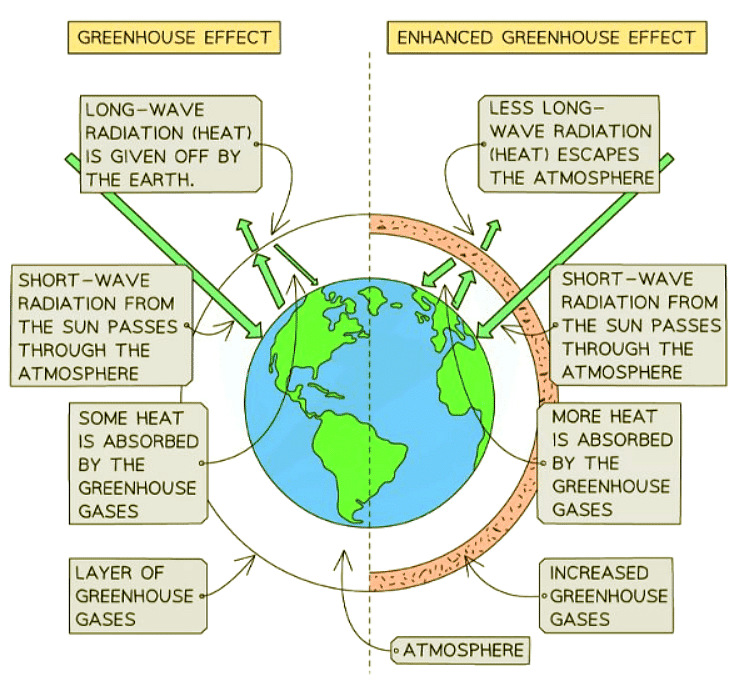Class 10 Exam > Class 10 Notes > Biology for GCSE/IGCSE > Other Pollution
Other Pollution | Biology for GCSE/IGCSE - Class 10 PDF Download
Plastic Pollution
- Plastics can have significant detrimental effects on both terrestrial and aquatic environments due to their inability to biodegrade.
- In marine ecosystems, animals frequently mistake plastic for food or get entangled in it, resulting in injuries and fatalities. As plastic degrades, it can release harmful toxins that impact marine life. Once broken down into tiny particles, it is often consumed by animals and enters the food chain.
- On land, plastic waste is typically discarded in landfills. As it decomposes, it releases toxins into the surrounding soil, rendering the land unsuitable for agriculture or livestock grazing. It may only be viable for construction purposes several decades after being buried.
Impact of Plastic Pollution on Animals
- Animals often ingest plastic or get entangled in it, leading to injuries and fatalities.
- When plastic breaks down, it can release harmful toxins that impact marine organisms.
- Microplastics, resulting from the breakdown, are frequently consumed by animals, entering the food chain.
Examples:
- Sea turtles mistake plastic bags for jellyfish and consume them, causing blockages in their digestive systems.
- Seabirds can get trapped in plastic debris, leading to suffocation or impaired mobility.
Impact of Plastic Pollution on Land
- Plastic waste is commonly disposed of in landfills.
- As plastic degrades, it releases toxins into the soil, rendering it unsuitable for agriculture or animal grazing.
- The land becomes usable only for construction purposes many years after plastic burial.
Examples:
- In agricultural areas, plastic fragments in the soil can affect crop growth and soil fertility.
- Toxic chemicals from degraded plastic can seep into groundwater, contaminating water sources.
Question for Other PollutionTry yourself: What is one of the impacts of plastic pollution on marine ecosystems?View Solution
Air Pollution
Methane and Carbon Dioxide
- Greenhouse gases act like a 'blanket' around the Earth's atmosphere, trapping heat.
- Increased levels of these gases, such as carbon dioxide and methane, have caused global warming and climate change.
- Human activities, like burning fossil fuels and raising livestock, are major contributors to the rising levels of these gases in the atmosphere.
- Burning fossil fuels releases carbon dioxide, while livestock farming produces methane gas.
- Global warming leads to the melting of permafrost in sub-polar regions, releasing more trapped methane into the atmosphere.

The document Other Pollution | Biology for GCSE/IGCSE - Class 10 is a part of the Class 10 Course Biology for GCSE/IGCSE.
All you need of Class 10 at this link: Class 10
|
110 videos|210 docs|33 tests
|
FAQs on Other Pollution - Biology for GCSE/IGCSE - Class 10
| 1. What are the main sources of plastic pollution? |  |
Ans. The main sources of plastic pollution include single-use plastics such as plastic bags, bottles, and packaging, as well as microplastics from products like cosmetics and clothing.
| 2. How does plastic pollution affect marine life? |  |
Ans. Plastic pollution can harm marine life through ingestion, entanglement, and habitat destruction. Animals may mistake plastic for food, leading to internal injuries and death.
| 3. What are some solutions to reduce plastic pollution? |  |
Ans. Some solutions to reduce plastic pollution include using reusable bags and containers, recycling plastic products, and supporting policies that limit single-use plastics.
| 4. How does air pollution impact human health? |  |
Ans. Air pollution can cause respiratory problems, heart disease, and other serious health issues. Breathing in polluted air can also worsen existing conditions like asthma and allergies.
| 5. What are some ways to reduce air pollution in urban areas? |  |
Ans. Some ways to reduce air pollution in urban areas include using public transportation, carpooling, biking, and supporting the use of clean energy sources like solar and wind power.
Related Searches















